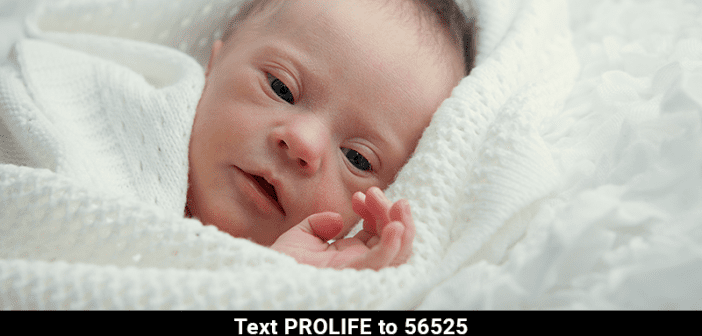Many parents who receive a Down syndrome diagnosis for their child before birth are given dire predictions about their child’s future and are told their son or daughter is better off dead. The horrific discrimination against people with potential disabilities is deadly because of legal, elective abortion. Not only do many doctors tell parents that they their children’s lives are not worth living but they also can kill those children through abortion.
This genocide against preborn babies with Down syndrome has become so rampant, even mainstream news outlets are taking note. Several years ago, major news organizations featured reporting on nations that had virtually “eliminated” Down syndrome. By this, they mean that genetic testing before birth was so common and abortion so widely available that almost every single child with the condition was killed before birth.
Recently, the Atlantic featured an in-depth feature on the experience of Danish families with a child who has Down syndrome. These families are becoming increasingly rare, because the only families like this in Denmark opt out of genetic testing and have a child with Down syndrome or receive a prenatal diagnosis of Down syndrome and make the culturally unconventional decision not to kill their child.
Because of state-funded prenatal screening, very few opt out. Because of the pervasive culture of death, very few families with a child diagnosed before birth choose Life. The problem of discriminatory abortion has become so grave in Denmark that in 2019 only 18 babies were born with the condition.
The Atlantic reports that Grete Fält-Hansen is one of the rare mothers who has a child with Down syndrome. Her son, Karl Emil, was diagnosed after his birth 18 years ago. Today, he is an outgoing and talkative young man with many hobbies and interests—and a girlfriend. Fält-Hansen’s experiences raising Karl Emil led her to the Landsforeningen Downs Syndrom, or the National Down Syndrome Association, in Denmark, which she now leads.
In this role, Fält-Hansen receives phones calls from parents who have been given a prenatal diagnosis and are trying to decide whether or not to kill their child. Since 2004, screening for Down syndrome is available for all pregnant mothers regardless of their age or other risk factors. Because the screening is available under the national health care service, the vast majority choose to be tested; more than 95 percent of the mothers who receive an indication of Down syndrome choose to end their son or daughter’s life.
There are still rare children born with the condition; these are what the Atlantic calls “The Last Children of Down syndrome.” Fält-Hansen has received calls from shocked parents who gave birth to a baby with Down syndrome after being told that their screening was negative. One couple even waited for the screening results to announce the pregnancy, telling friends and family, “We wanted to wait, because if it had Down syndrome, we would have had an abortion.”
This shocking dehumanization and discrimination against people with Down syndrome is the norm in Denmark now, even though Down syndrome is not a life-limiting condition. Down syndrome comes with an increased risk of certain heart conditions and developmental delays, but, as the article notes, “It is very much compatible with life—even a long, happy life.”
Yet, according to the reporter at the Atlantic, which is also the experience of many parents around the world, “Some Danish parents told me that doctors automatically assumed they would want to schedule an abortion, as if there was really no other option.” Screening for Down syndrome is not for the purpose of life-saving intervention, because, as the article notes, “The only intervention offered for a prenatal test that finds Down syndrome is an abortion.”
Karl Emil, and other young adults with Down syndrome, are well aware of the discrimination against them. Increasingly, individuals with Down syndrome are speaking out about the value of every human Life and calling for an end to the deadly discrimination.
Despite this, doctors and scientists continue to push for the “elimination” of Down syndrome, failing to see that eliminating the condition requires killing every person with the genetic abnormality. For example, Laura Hercher, a genetic counselor and the director of student research at Sarah Lawrence College told the Atlantic, “If no one with Down syndrome had ever existed or ever would exist—is that a terrible thing? I don’t know.” She elaborated on the potential health complications for individuals with Down syndrome and said, “I don’t think anyone would argue that those are good things.” Of course, potential health challenges are not good, but we cannot end suffering without killing the sufferer, as ethicist Wesley J. Smith often observes.
The Atlantic rightly describes the discriminatory abortions committed on babies with Down syndrome as “only the beginning.” Many parents are clamoring for genetic screening for Autism and sex selective abortions are still common. When the preborn child is not viewed as a person with the Right to Life, people can justify killing that person for many arbitrary reasons. Discriminatory abortion against children with Down syndrome is sobering, and the tragic phenomenon also points the way forward in protecting preborn Life. We must protect every human Life, without exception.

